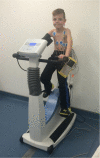Exercise prescription improves exercise tolerance in young children with CHD: a randomised clinical trial
- PMID: 33990433
- PMCID: PMC8127973
- DOI: 10.1136/openhrt-2021-001599
Exercise prescription improves exercise tolerance in young children with CHD: a randomised clinical trial
Abstract
Objective: The main objective of this study was to ascertain if a structured intervention programme can improve the biophysical health of young children with congenital heart disease (CHD). The primary end point was an increase in measureable physical activity levels following the intervention.
Methods: Patients aged 5-10 years with CHD were identified and invited to participate. Participants completed a baseline biophysical assessment, including a formal exercise stress test and daily activity monitoring using an accelerometer. Following randomisation, the intervention group attended a 1 day education session and received an individual written exercise plan to be continued over the 4-month intervention period. The control group continued with their usual level of care. After 4 months, all participants were reassessed in the same manner as at baseline.
Results: One hundred and sixty-three participants (mean age 8.4 years) were recruited, 100 of whom were male (61.3%). At baseline, the majority of the children were active with good exercise tolerance. The cyanotic palliated subgroup participants, however, were found to have lower levels of daily activity and significantly limited peak exercise performance compared with the other subgroups. One hundred and fifty-two participants (93.2%) attended for reassessment. Following the intervention, there was a significant improvement in peak exercise capacity in the intervention group. There was also a trend towards increased daily activity levels.
Conclusion: Overall physical activity levels are well preserved in the majority of young children with CHD. A structured intervention programme significantly increased peak exercise capacity and improved attitudes towards positive lifestyle changes.
Keywords: cardiac rehabilitation; congenital; heart defects; obesity.
© Author(s) (or their employer(s)) 2021. Re-use permitted under CC BY-NC. No commercial re-use. See rights and permissions. Published by BMJ.
Conflict of interest statement
Competing interests: None declared.
Figures




Similar articles
-
Impact of a centre and home-based cardiac rehabilitation program on the quality of life of teenagers and young adults with congenital heart disease: The QUALI-REHAB study rationale, design and methods.Int J Cardiol. 2019 May 15;283:112-118. doi: 10.1016/j.ijcard.2018.12.050. Epub 2018 Dec 20. Int J Cardiol. 2019. PMID: 30616811 Clinical Trial.
-
Physical self-concept and its link to cardiopulmonary exercise tolerance among adolescents with mild congenital heart disease.Eur J Cardiovasc Nurs. 2015 Jun;14(3):206-13. doi: 10.1177/1474515114521926. Epub 2014 Feb 5. Eur J Cardiovasc Nurs. 2015. PMID: 24500873
-
Structured, intensive education maximising engagement, motivation and long-term change for children and young people with diabetes: a cluster randomised controlled trial with integral process and economic evaluation - the CASCADE study.Health Technol Assess. 2014 Mar;18(20):1-202. doi: 10.3310/hta18200. Health Technol Assess. 2014. PMID: 24690402 Free PMC article. Clinical Trial.
-
Exercise training in paediatric congenital heart disease: fit for purpose?Arch Dis Child. 2022 Jun;107(6):525-534. doi: 10.1136/archdischild-2020-321390. Epub 2021 Sep 17. Arch Dis Child. 2022. PMID: 34535443 Review.
-
Physical Activity Promotion in Pediatric Congenital Heart Disease: Are We Running Late?Can J Cardiol. 2020 Sep;36(9):1406-1416. doi: 10.1016/j.cjca.2020.07.003. Epub 2020 Jul 14. Can J Cardiol. 2020. PMID: 32673643 Review.
Cited by
-
Strategies to Overcome Barriers to Physical Activity Participation in Children and Adults Living With Congenital Heart Disease: A Narrative Review.CJC Pediatr Congenit Heart Dis. 2024 May 10;3(4):165-177. doi: 10.1016/j.cjcpc.2024.05.002. eCollection 2024 Aug. CJC Pediatr Congenit Heart Dis. 2024. PMID: 39493665 Free PMC article. Review.
-
Facility-Based and Virtual Cardiac Rehabilitation in Young Patients with Heart Disease During the COVID-19 Era.Pediatr Cardiol. 2024 Oct;45(7):1533-1541. doi: 10.1007/s00246-023-03202-0. Epub 2023 Jun 9. Pediatr Cardiol. 2024. PMID: 37294337 Free PMC article.
-
Effects of Sports, Exercise Training, and Physical Activity in Children with Congenital Heart Disease-A Review of the Published Evidence.Children (Basel). 2023 Feb 2;10(2):296. doi: 10.3390/children10020296. Children (Basel). 2023. PMID: 36832425 Free PMC article. Review.
-
ehealth technology in cardiac exercise therapeutics for pediatric patients with congenital and acquired heart conditions: a summary of evidence and future directions.Front Cardiovasc Med. 2023 Jun 2;10:1155861. doi: 10.3389/fcvm.2023.1155861. eCollection 2023. Front Cardiovasc Med. 2023. PMID: 37332590 Free PMC article. Review.
-
Brazilian Guideline for Exercise Testing in Children and Adolescents - 2024.Arq Bras Cardiol. 2024 Sep 16;121(8):e20240525. doi: 10.36660/abc.20240525. Arq Bras Cardiol. 2024. PMID: 39292116 Free PMC article. English, Portuguese.
References
-
- McCrindle BW, Williams RV, Mital S, et al. . Physical activity levels in children and adolescents are reduced after the Fontan procedure, independent of exercise capacity, and are associated with lower perceived general health. Arch Dis Child 2007;92:509–14. 10.1136/adc.2006.105239 - DOI - PMC - PubMed
Publication types
MeSH terms
LinkOut - more resources
Full Text Sources
Other Literature Sources
Medical
